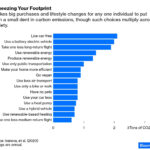June 10, 2019 – In an announcement today, Joachim Wenning, CEO of Munich Re, currently the number one reinsurance company (Swiss Re closely follows) asked European policymakers to put a higher price on carbon emissions. Wenning is quoted in the Financial Times today stating, “on the current trajectory of carbon emissions we have to expect an increase of global temperatures by 3.5 Celsius by the end of the century.” That forecasted number is more than double what was set as an optimal temperature increase target at the Paris climate summit in 2015.
Wenning argues for a meaningful price on carbon whether through a cap-and-trade marketplace or a price per ton. He points to Sweden which has set a 115 Euros carbon price per ton versus the European Union at 24 Euros. I’m glad he didn’t mention Canada at 20 Canadian dollars, equivalent to 13.33 Euros. I would have been embarrassed for my country’s climate change mitigation efforts to-date.
A year ago, August, Munich Re announced that it was limiting its investments in companies that make a significant percentage of income from the burning of coal and giving up millions in premiums that would normally come its way. At the time Wenning called this decision, short-term pain for global long-term gain.
Why would a reinsurer be talking about bumping up carbon prices, and dropping companies as clients that could add to its bottom line?
The nature of the reinsurance and insurance industries is to spread risk and make the right bets to stave off payouts because of catastrophic events. Munich Re as an underwriter of insurance companies is looking at the risk of rising sea levels, of extreme weather events, and of industries that contribute to environmental problems. Reinsurers call the shots on bank loans for big projects. Without insurers having a green light from a reinsurer, a company may find itself unable to finance the construction of a new beachfront condominium in South Florida, or a coal mine in Wyoming.
That August announcement wasn’t the first time that Munich Re executives called for action by the insurance industry to send a signal to companies and governments that current market solutions to address climate change could only be described as anemic. At a conference in June 2018, Wenning called for cities to accelerate action on climate change.
His equivalent at AXA SA, Thomas Buberi, a large European-based reinsurer, noted at the 2017 Davos conference that below ground private property in cities like New York and Mumbai would likely not be insurable in another decade at the rate of atmospheric warming.
Why below ground?
Because of sea level rise and extreme weather flood risk.
Buberi continued, noting that “if you go much further to 2020, 2030, we can clearly say that at a scenario between 3 and 4 degrees, it’s not insurable anymore.” The “it” refers to private property like basement shops.
The reinsurance industry has created a global action framework for cities, noting that this is where the majority of humanity resides, and therefore so does the majority of risk. Of the ten actions called for, four address environmental concerns. They are:
- Build climate and disaster-resilient communities and economies.
- Promote healthy lifestyles and prevent pollution.
- Promote sustainable energy and resource efficiency.
- Help develop climate and disaster risk management strategies and plans.
Reinsurers want to see more research on:
- the effects of climate change and ecosystem degradation in the context of communities.
- climate change and ecosystem risks in catastrophe risk assessments.
Reinsurers want to offer risk management services to cities and businesses including:
- disaster preparedness and early warning systems.
- disaster-resilient land-use planning, building codes, coastal management infrastructure standards, and enforcement.
And reinsurers want to play a greater role in:
- helping local governments to understand how to make risk-informed decisions.
- focusing on natural climate mitigation strategies such as conservation and restoration of forests, mangroves, wetlands, coral reefs, and other ecosystems.
- including new sets of financial instruments going beyond underwriting of policies such as catastrophe and resilience bonds.
In Wenning’s call for higher carbon prices, he is alerting governments that the reinsurance industry is focused on achieving the goals of the Paris Climate Agreement and making those it insures agents for making the targets happen. Reinsurers intend to use the instruments available to them, the cost of premiums going forward and are calling for governments and businesses to become climate-change focused in all aspects of planning and operations.
In November 2018, 16 reinsurers including Munich Re, AXA, and others and formed a partnership with the United Nations to provide their expertise to stop the world from becoming “uninsurable” describing this as “a price that society could not afford.”
















